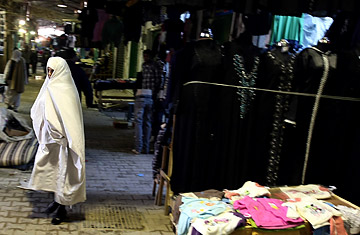
A Libyan woman walks through a market in the rebel stronghold of Benghazi on April 6
Muammar Gaddafi remains hunkered down in Tripoli, ever defiant despite the the heaviest bombing of NATO's three-month campaign. But outside Libya, the talk has moved on from war to the business opportunities offered by a post-Gaddafi Libya.
It's hard to envision a booming Libyan economy with the country's communication infrastructure shattered by bombs and its oil fields abandoned and idle. Yet economists and investors say that as an intensifying NATO campaign brings Gaddafi's 42-year rule closer to its end, a bright future lies ahead — with Libya's mammoth energy reserves capable of financing a postwar development program strong enough to serve as a growth engine for the region. "Libya has $250 billion in foreign-exchange reserves, and it can just keep on tapping into foreign currency because of its oil sales," says Jacob Kolster, North Africa director for the African Development Bank. "The potential is huge."
Gaddafi's Libya is hardly poor, with few of the problems that beset neighboring Egypt, where about 40% of people live on about $2.50 or less a day. The average Libyan household income is more than $14,000 a year, according to U.N. statistics, and the literacy rate is about 86%.
Assuming that Libyans can find an inclusive political consensus that minimizes the risk of an Iraq-style insurgency after Gaddafi goes, Libya's natural wealth and educated population positions it for a massive boom — if peace, stability and a business-friendly government can be established, all of which are big ifs. The country retains considerable sovereign wealth, even if much of it is currently frozen abroad at the moment. And international energy companies that have suspended their Libya operations as a result of the conflict plan to return as soon as sufficient security has been restored to begin pumping oil again.
Even the war damage could, ironically, drive economic growth through the massive investment that will be needed to replace bombed-out communications infrastructure, airports and buildings. "We will need to build virtually anew the entire modern infrastructure," Kolster told TIME in Lisbon, where hundreds of investors and bankers are gathered this week for the African Development Bank's annual meetings. Libya is one of the 53 African members of the bank, which is headquartered in Tunis, and manages about $67 billion in capital.
The investment stakes in Libya, say the African bankers who are meeting in Lisbon — where neither the regime nor the rebels have sent representatives — are not focused on the country's energy contracts, most of which are already accounted for. Instead, the opportunities lie in developing other potential industries. There is no tourist development along Libya's hundreds of miles of pristine Mediterranean coastline, a short hop from Europe. And thousands of square miles of arable land lie relatively undeveloped.
Libya itself already holds major investments throughout Africa, including a chain of luxury hotels owned by Gaddafi's regime in Mali, Sudan and elsewhere. Gaddafi's successor will be pressed by the banking community to privatize those hotels, perhaps selling them to foreign partners. "There's a drastic reshuffling of the decks," says Papa Madiaw Ndiaye, CEO of Advanced Finance & Investment Group, a private-equity company in Dakar, Senegal, which invests in projects across Africa. "It's a chance for new people to get into these countries and bring in a whole new energy."
